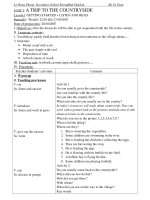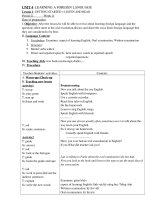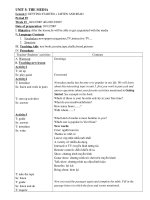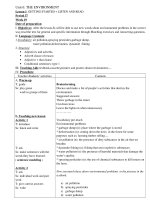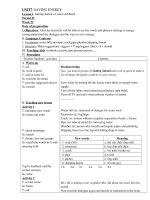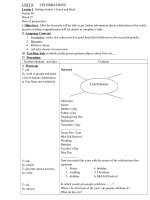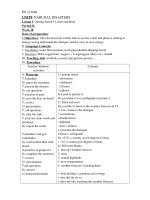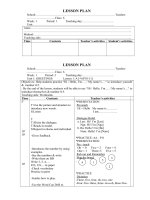untin 6
Bạn đang xem bản rút gọn của tài liệu. Xem và tải ngay bản đầy đủ của tài liệu tại đây (77.19 KB, 12 trang )
Unit 6: THE ENVIRONMENT
Lesson 1: GETTING STARTED + LISTEN AND READ
Period 37
Week 19
Date of preparation:
I. Objectives: After the lesson,Ss will be able to use new words about environmental problems in the correct
way,read the text for general and specific information through Matching exercises and Answering questions.
II. Language Contents:
1.Vocobulary: air pollution,spraying pesticides,garbage dump,
water pollution,deforestation, dynamite fishing
2. Structure:
• Adjectives and adverbs.
• Adverb clause of reason
• Adjective + that clause
• Conditional sentences: type 1
III. Teaching Aids:textbook,cassette,pictures and posters about environment,……
IV. Procedure
Teacher-Students’ activities Contents
A. Warm-up
T: guide
Ss: play game
work in groups of three
B. Teaching new lesson
Activity 1
T: introduce
Ss: listen and write
T: ask
Ss: make sentences with the
words they have learned.
( sentence modeling )
Activity 2
T: ask
Ss: individual work and pair
work
T: give correct answers
Ss: write
Brainstorming
Discuss and make a list of people’s activities that destroy the
environment.
Suggested answers:
Throw garbage in the street
Cut down trees
Leave the lights on when unnecessary
…. ….. …… …….
Vocabulary pre-teach
Environmental problems
* garbage dump (n): place where the garbage is stored
* deforestation (n): cutting down the trees in the forest for some
purposes such as: farming.timber selling……
* air pollution (n): the presence of dirty substances in the air that we
breathe.
* dynamite fishing (n): fishing that uses explosive substances.
* water pollution (n): the presence of harmful materials that damage the
water’s quality.
* spraying pesticides (n): the use of chemical substances to kill insects on
the farm.
Now you match these above environmental problems to the pictures in the
textbook.
a) air pollution
b) spraying pesticides
c) garbage dump
d) water pollution
T: take the tape
Ss: listen and read
T: ask
Ss: match
T: call on some Ss
Ss: read the full sentences
T: give correct answers
T: ask
Ss: read
T: ask
Ss: compare their answer
T: go around the class and
provide necessary correctinos
and give correct answers
Ss: write
Activity 3
T: ask
Ss: work in groups
T: call on some Ss
Ss: read
C. Consolidation
T: remind
Ss: listen and remember
D. Homework
T: give the exercise
Ss: write
e) deforestation
f) dynamite fishing
Now you listen and read the passage in the book: Mr. Brown is talkinh to
some volunteer conservationists.
Now you match the names in column A with the tasks in column B. then
write the full sentences.
Group 1 f) walk along the shore.
Group 2 e) check the sand
Group 3 b) check among the rocks
Mr. Jones a) collect all the bags and take them to the garbage dump
Mrs. Smith c) provide a picnic lunch for everyone
Mr. Brown d) give out the bags
Now you read the passage again and answer the questions in b)
1. The speaker is Mr. Brown.
2. The listeners are members of volunteer conservationists.
3. They are on the beach.
4. If they work hard,they will make the beach clean and beautiful
again soon.
Now you work in group of four and diacuss questions 6 & 7 in the book:
Have you ever done anything similar? If yes,what did you do? Where did
you do it?
If the pollution continues,what might happen?
Summarize the main points
Give the correct form of the words in the brackets.
1. Air (pollution) is a very burning issue.
2. More and more volunteer (conversation) are now actively
engaging in the environmental protection campaign.
3. People have (achievement) considerable results inprotecting our
environment.
4. (Deforest) is one of the main reasons for natural disasters.
Unit 6: THE ENVIRONMENT
Lesson 2: SPEAK
Period 38
Week 19
Date of preparation:
I. Objectives: After the lesson,Ss will be able to persuade other people by using given expressions
II. Language Contents:
1.Vocobulary: wrap,dissolve,trash=garbage,trafic jam,exhaust fume,…..
2. Structure:
• I think you should……….
• Why not…………?
• Why don’t you………………….?
III. Teaching Aids:textbook,cassette,……
IV. Procedure
Teacher-Students’ activities Contents
A. Warm-up
T: set up
Ss: play game
T: ask
Ss: read
T: give the correct answers
Ss: write
B. Teaching new lesson
I. Pre-speaking
T: give some words
Ss: write
T: wirte all the new words on
the board in both English and
Vietnamese.
Rub out all English words
Ss: write these words again
occording to equivalences.
II. While-speaking
T: ask
Ss: read
T: make sure Ss understand all
of the ideas suggested
Ss: work in pairs
Jumbled words
Now you work I groups of 4,put the letters in the right order to make good
words.
1. onpilulo
2. mpud
3. ira
4. sptesecidi
5. ands
Answers:
1. pollution
2. dump
3. air
4. pesticides
5. sand
wrap (V): cover,folk something as protection.
dissolve (V): change something from solid and liquid condition.
trash=garbage
garbage bin (n): a box (closed place) for storing garbage.
traffic jam (n): a stle that vehicles get stuck in the street.
exhaust fume (n): gases escaped from motor vehicles as waste products.
Now you read the persuading expressions and the idea cues given in the
textbook carefully. Persuade their partners to do things to protect the
environment.
Example:
A: I think it would be better if we use banana leaves instad of paper or
plastic bags to wrap food.
T: go around and provide
help,call on some pairs
Give feedback and suggested
answers
Ss: consult
III. Post-reading
T: ask
Ss: work in groups
T: call on some Ss from groups
to present in front of the class
Ss: read
T: give feedbacks and
suggested answers
Ss: write
C. Consolidation
T: remind
Ss: listen and remember
D. Homework
T: give the exercise
Ss: write
B: Why? How come?
A: Because plastic bags are very hard to dissolve,they will cause
pollution. And if we use less paper,we can save trees in the forests. That’s
how we can save the environment.
1.
A: I think it would be better if we reuse and recycle bottles and cans.
B: Why? How come?
A: Because reusing and recycling bottles can reduce garbage and save
natural resources.
2.
A: I think it would be better if we don’t throw trash onto water.
B: Why? How come?
B: Because it can keep the water clean. Polluted water can directly do
harm to people’s health and kill fish.
3.
A: I think it would be better if we go to work by bike.
B: Why? How come?
A: Because going to work by bike can save energy and at the same time it
can keep the air cleaner.
Now you work in groups and find the answers to the qestionare.
How can we …………….
• save paper?
• use fewer plastic bags?
• reduce water pollution?
• prevent littering?
• reduce air pollution?
• reduce the amount of garbage we produce?
Save papers by:
Recycling and reusing paper
Using tree leaves to wrap food and other things
Summarize the main points
Match the verb in A to the words in B.
A B
1. wrap a. public buses
2. throw b. food
3. save c. trash
4. use d. energy
Unit 6: THE ENVIRONMENT
Lesson 3: LISTEN
Period 39
Week 20
Date of preparation:
I. Objectives: After the lesson,Ss will be able to complete the information notes about ocean pollution
through areport,use new word in the right context by playing word games and engaging in different class
activities.
II. Language Contents:
1.Vocobulary: raw sewage,oil spills,marine life,waste materials,regulations,…….
2. Structure:
• I think you should……….
• Why not…………?
• Why don’t you………………….?
III. Teaching Aids:textbook,cassette,……
IV. Procedure
Teacher-Students’ activities Contents
A. Warm-up
T: call on
Ss: go to the board
B. Teaching new lesson
I. Pre-listening
T: guide
Ss: play game
T: ask
Ss:have guesses on how the
ocean in polluted
T: call on
Ss: explain their ideas in front
of class
II. While-listening
T: set the scene
Ss: listen
T: take the tape
Ss: listen and complete the
notes
T: ask
Ss: compare the answer with
a partner
T: call on some Ss
Ss: read
T: give the correct answers
Ss: write
Match the verb in A to the words in B.
A B
1. wrap a. public buses
2. throw b. food
3. save c. trash
4. use d. energy
Wrap food Throw trash Save energe Use public buses
Raw sewage (n): untreated wastewater
Oil spills (n): the release of oil (generally,petroleum) into the natural
environment,usually the ocean
Marine life (n): plants and animals of the ocean
Waste materials (n): waste materials,especially metal awaiting reprocessing
Regulations (n): rules
Now you are going to listen to a report on how our oceans are polluted. Study
the notes carefully then listen to the tape and complete the notes
How the ocean is polluted
Firstly: raw sewage is pumped directly into the sea.

